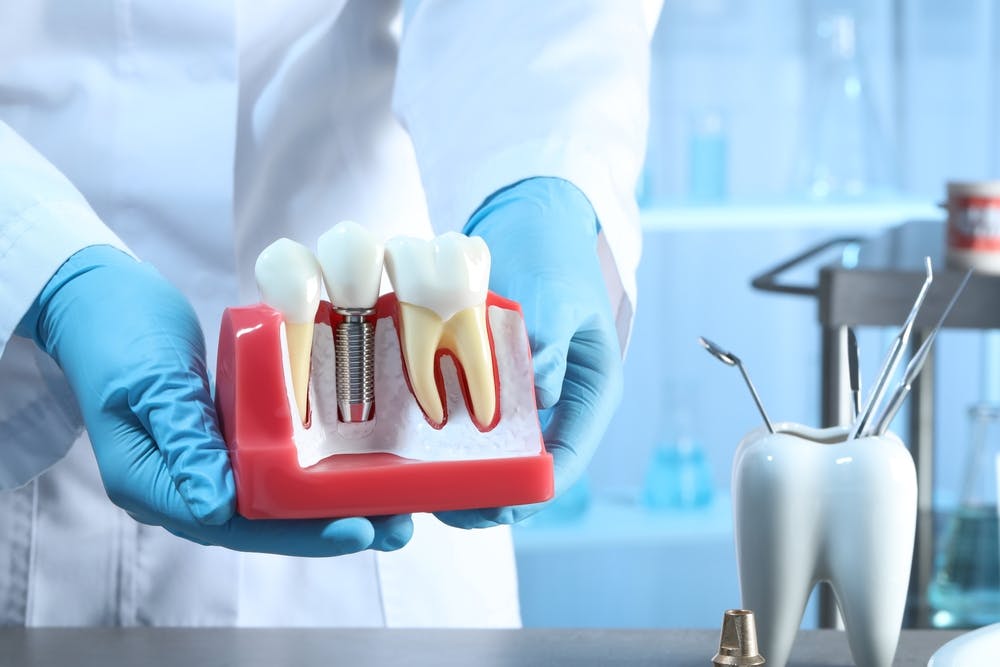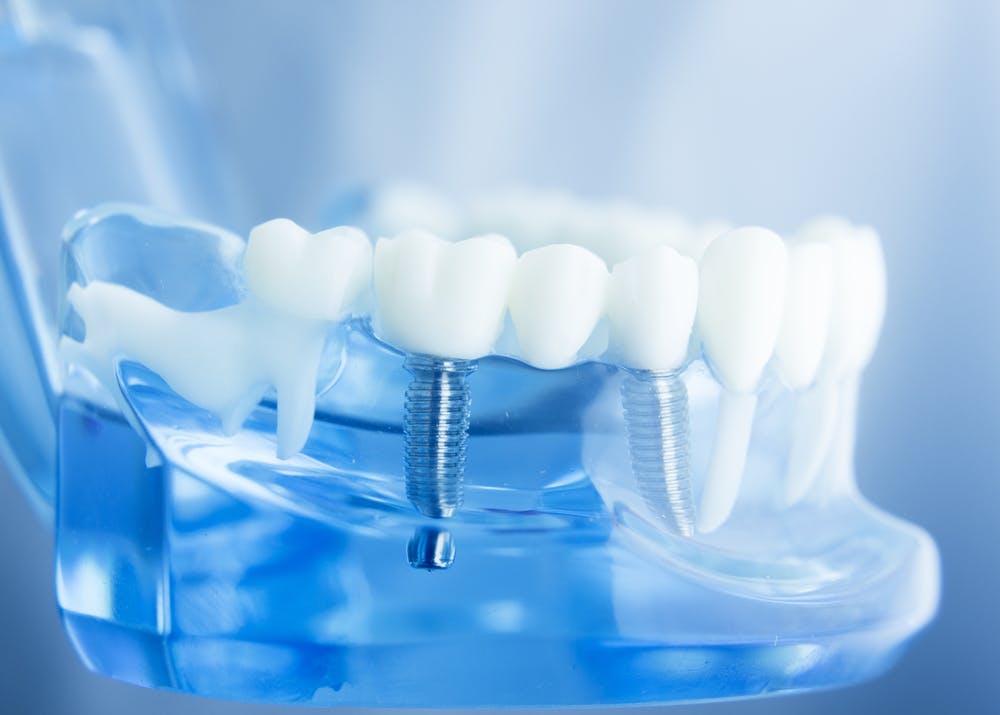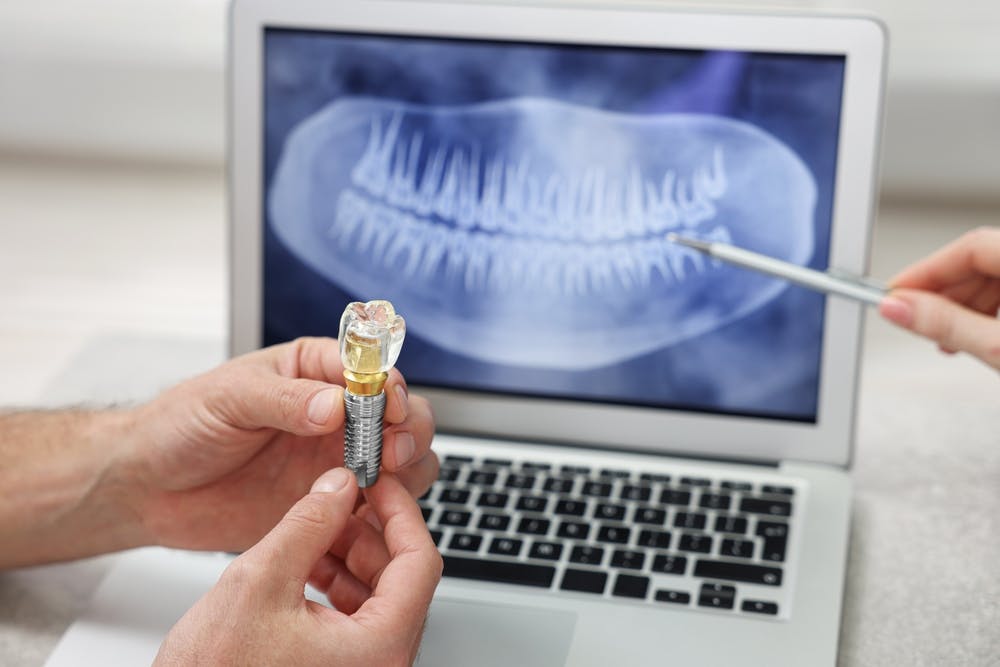Dental Implants: The Best Replacement for Missing Teeth
Explore Types of Dental Implants
Tooth loss can be devastating
Tooth loss can have devastating effects, leading to impaired dental function, jawbone degeneration, and cosmetic concerns. Thankfully, advanced dental procedures, such as dental implants are available to patients. Dental implants are titanium posts that integrate with your jaw to support a range of restorations.
These titanium posts help restore both form and function to your smile. As a matter of fact, dental implants are the only type of restorative procedure that stimulates the jawbone, similar to the root of a tooth. As a result, bone stimulation prevents bone recession and preserves oral health.

What are Dental Implants?
Dental implants are small, threaded titanium posts, which are placed in the jaw to replace missing tooth roots. The titanium posts become a permanent part of your jaw and serve as a solid foundation for esthetic, natural restorations.
In most cases, a dental crown is supported by one post, an implant-supported bridge by two or more posts, and a permanent denture by four or more posts. Then, abutments are attached to the top of the implants to securely hold your restorations in place. These abutments and your dental implants create a lasting solution for tooth loss. With proper care, the implant restoration can last a lifetime.asdfsf
Benefits of Dental Implants
One of the most unique advantages of dental implants is the fact that they prevent bone loss. Unlike traditional replacement options for tooth loss, implants stimulate the jawbone in the same way that natural tooth roots can. This process, which helps your bone respond to mechanical pressure, is called the piezoelectric effect.
When you chew, signals are transmitted from your jawbone to your brain. In response, nutrients are sent to the bone to keep it healthy and strong. Implants continue to send these signals for decades, and are considered to be the most successful and reliable tooth replacement option available today.
Because traditional alternatives such as bridges, partials, or dentures do not mimic natural teeth roots, bone density will decrease over time, resulting in jawbone recession. This degeneration of bone can lead to a lack of support for the facial structures, causing a concave or “sunken-in” appearance.
As noted above, implants provide a wide array of benefits. Furthermore, dental implants offer:
- Durability
Dental implants are resilient and strong. They commonly last a lifetime with proper care, becoming a permanent part of your oral anatomy.
- Improved Aesthetics
Restored dental implants can look and feel just like natural teeth. Modern restorative materials can be color-matched to blend with your smile for a brilliant, lifelike appearance.
- Increased Confidence
When you are missing teeth, you may find yourself covering your mouth when you laugh or smile. Dental implants fill in the gaps for an aesthetic appearance and a considerable boost in self-esteem.
- Improved Speech
Traditional removable dentures can slip and lead to slurred and unclear speech. Dental implants function like natural teeth, so you can speak with confidence.
- Optimal Function
Once your jaw has healed around your implants, you will have no dietary restrictions. You can continue to eat the foods you love without worry.
- No Cavities
Unlike natural teeth, dental implants are not susceptible to tooth decay. However, it is important to brush and floss to avoid gingivitis and gum disease that can develop in the gums around the implant.
- Predictability
Dental implants are dependable and reliable when placed by an experienced dentist. Compared to alternative replacement options, implants boast an extremely high success rate.
- Preservation of Healthy Teeth
When receiving a traditional dental bridge, your adjacent teeth must be altered to support the restoration. With dental implants, your healthy teeth are left intact, as implant placement does not affect healthy tooth structure.

Candidate For Implants
Your oral and overall health is of the utmost importance when considering dental implants. Sufficient jaw bone is needed for implants and implant-supported restorations.
Healthy gum tissue, free of periodontal disease is necessary before placing an implant. After all, your dentist wants implant to feel like your own, and last forever.
You may need a dental implant if:
Missing a tooth from a dental injury
Lost a tooth due to periodontal disease
Other reason for missing teeth
Preparing for a Dental Implant
Before having dental implants placed, our dentists will follow routine steps to assess your oral, medical and general health. We will carefully examine your oral cavity, including the area of the missing tooth. Also, our doctors will assess your bite and evaluate any aesthetic concerns.During an in-depth consultation, our doctors can determine if you require any procedures to prepare your mouth for successful treatment. In some cases, prerequisite procedures may be necessary for successful treatment. Some common preparatory procedures include:
Tooth Extraction
Bone Grafts
Sinus Lifts
Periodontal Therapy
One or more restorative procedures may be necessary to prepare your oral cavity. On the other hand, some can simply improve the longevity or durability of your results.
- Tooth Extractions
Some teeth cannot be saved from extraction.
Tooth extraction is a commonly performed procedure that can restore oral health in patients who have suffered advanced tooth infection, an accident, or tooth impaction.
- Bone Grafts
In some cases, your bone density may be insufficient for proper implant placement.
Not to worry, bone grafting provides long-term support for implants.
The grafting material can either be harvested from your own body or another source.
- Sinus Lifts
A sinus lift may be required before replacing a missing molar or premolar tooth in the rear of the upper jaw. The maxillary sinus can drop into the space left by the missing tooth.
Once the sinus lift has fully healed, the bone will have regained its original strength and stability. As a result, patients are ready for dental implant surgery.
- Periodontal Therapy
Periodontal maintenance therapy is specialized care to prevent the return of periodontal disease. Patients with periodontal disease begin with scaling and root planing procedure to remove harmful toxins.
If left untreated, periodontal issues can cause dental implants to fail because of damaged bone and gum tissues.

Can dental implants preserve bone?
This is one of the most important features of dental implants. Once in place and supporting teeth, everyday functional forces (eating, smiling, talking) stimulate the surrounding bone, which responds by becoming stronger and denser.
Like all things, there are limits as to how much an implant can do. For that reason, you may require one or more procedures to prepare your oral cavity for implantation.

Bridge vs Implant
Both a bridge and a dental implant are solutions for replacing a missing tooth.
A bridge provides a replacement tooth by using teeth on either side of the missing tooth for support. Teeth adjacent to the missing tooth (or teeth) will need to be reduced, which may compromise the healthy teeth. Since a bridge does not replace the missing root structure, you are at an increased risk of bone loss over time. Keeping a bridge clean requires frequent cleaning to prevent bacteria buildup.
Another option is a dental implant, which serves as an artificial root, anchoring the replacement tooth in place. This also helps protect and preserve the area from tissue loss and recession. An implant can be cared for just like any natural tooth. It also does not require the removal of potentially healthy tooth structure from the neighboring teeth to support it.
Get In Touch
Contact our dental office today!
Please complete our contact form and one of our patient coordinators will get back to you in a jiffy.
- Address
- 6509 Government St, Ste A Baton Rouge, LA 70806
- Number
- (225) 924-1824
- Email
- info@levyvuteradental.com
We care about protecting your data. Read our Privacy Policy.
Sign up to receive news and updates in your inbox
We care about the protection of your data. Read our Privacy Policy.